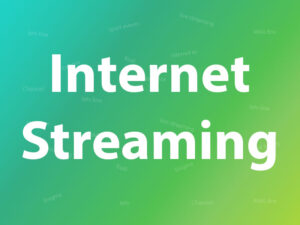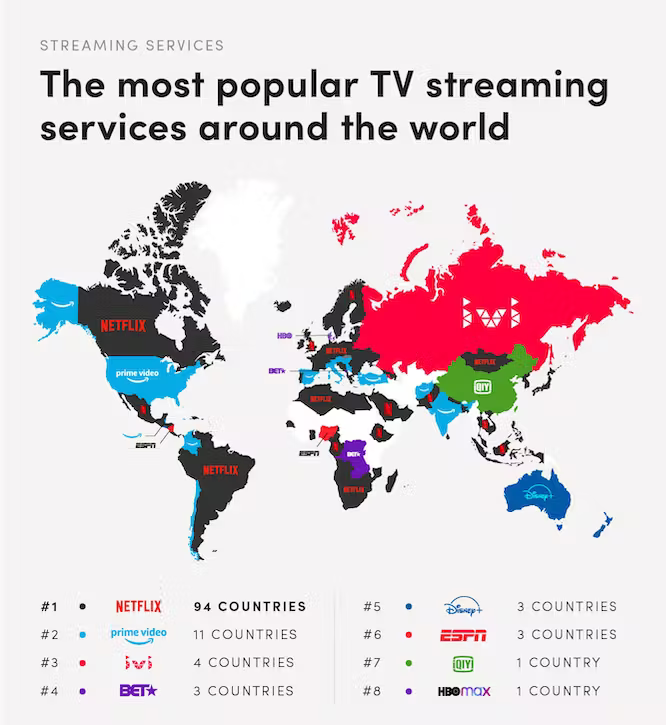What is Internet Streaming?
In the digital age, where instant access to information and entertainment has become a norm, internet streaming has emerged as a game-changer. It revolutionized the way we consume media, allowing us to watch videos, listen to music, and experience live events in real time, all through the power of the internet.

Understanding Internet Streaming
Definition of Internet Streaming: Internet streaming refers to the method of transmitting data, typically audio or video, over the Internet in real time. Unlike traditional downloading, where you need to wait for the entire file to be downloaded before accessing it, streaming enables seamless playback as the data is delivered continuously.
How Internet Streaming Works: When you click play on a streaming platform, such as Netflix or Spotify, the content is broken down into small data packets. These packets are sent to your device over the internet and are immediately rendered, allowing you to watch a video or listen to music without any significant delay.
Types of Internet Streaming
Video Streaming: Video streaming is perhaps the most popular form of internet streaming. From movies and TV shows to user-generated content, video streaming platforms offer an extensive library of content for users to enjoy on-demand.
Audio Streaming: Audio streaming has changed the way we listen to music. With services like Spotify and Apple Music, you can access millions of songs from various artists and genres with just a few taps on your smartphone.
Live Streaming: Live streaming has gained immense popularity, especially with the rise of social media platforms. It allows users to broadcast real-time events, such as concerts, gaming sessions, and news updates, to a global audience.
Popular Internet Streaming Services
Netflix: Netflix, founded in 1997, played a significant role in popularizing internet streaming. It offers a vast collection of movies, TV shows, and original content that users can stream on various devices.
Spotify: Spotify revolutionized the music industry by providing users with instant access to millions of songs. It allows users to create playlists, discover new music, and follow their favorite artists.
YouTube: YouTube, the world’s largest video-sharing platform, offers a diverse range of content, from educational videos to entertaining vlogs and music videos.
Twitch: Twitch is a leading platform for live streaming, primarily focused on gaming content. It enables gamers to interact with their audience in real time through live chat.

Advantages of Internet Streaming
Convenience and Flexibility: Internet streaming allows users to enjoy their favorite content anytime and anywhere, eliminating the need for physical media or fixed schedules.
Cost-Effectiveness: With affordable subscription plans and free ad-supported options, streaming services provide cost-effective access to a vast array of content.
Wide Variety of Content: Streaming platforms offer diverse content catering to different interests and preferences, ensuring there’s something for everyone.
Real-time Interaction: Live streaming enables real-time interaction between content creators and their audience, fostering a sense of community.
Challenges and Limitations of Internet Streaming
Internet Speed and Connectivity: Streaming quality heavily relies on internet speed and stability. Slow or unreliable connections can lead to buffering issues.
Copyright and Piracy Issues: Internet streaming has also raised concerns about copyright infringement and unauthorized distribution of content.
Buffering and Latency: Even with high-speed internet, buffering, and latency can still occur, causing interruptions in the streaming experience.
The Future of Internet Streaming
Advancements in Technology: As technology continues to evolve, we can expect higher-quality streaming, better compression algorithms, and enhanced user experiences.
Integration with Smart Devices: Internet streaming is likely to become more integrated with smart devices, enabling seamless streaming across various gadgets.
Virtual Reality and Augmented Reality Streaming: With the growing popularity of VR and AR, streaming platforms may explore delivering immersive experiences through these technologies.
Impact of Internet Streaming on Traditional Media
Changing Viewing Habits: Internet streaming has led to a shift in viewing habits, with an increasing number of people preferring on-demand content over traditional TV.
Disruption in the Entertainment Industry: The rise of internet streaming has disrupted the entertainment industry, challenging traditional distribution models.
Internet Streaming and Data Consumption
Data Usage Considerations: Streaming consumes data, and users need to be mindful of their data plans to avoid overage charges.
Impact on Internet Infrastructure: The widespread adoption of streaming services has put pressure on Internet infrastructure, leading to the need for higher bandwidth capabilities.
Internet Streaming and Environmental Impact
Carbon Footprint of Streaming: Streaming contributes to carbon emissions, with data centers and devices consuming energy during streaming.
Sustainable Streaming Practices: Efforts are being made to make streaming more eco-friendly, such as using renewable energy sources for data centers.
Conclusion
Internet streaming has redefined the way we access and experience media. It offers unparalleled convenience, a vast range of content, and real-time interaction with creators and other viewers. As technology continues to advance, internet streaming will only become more accessible and immersive, transforming the way we entertain ourselves.
FAQs
- What equipment do I need for internet streaming? To start internet streaming, you’ll need a device such as a computer, smartphone, or smart TV, along with a reliable internet connection and a streaming platform subscription if applicable.
- Can I watch live events through internet streaming? Yes, many streaming platforms offer live streaming options, allowing you to watch events as they happen in real-time.
- Is internet streaming legal? Yes, internet streaming is legal as long as you use legitimate streaming services and do not engage in piracy or copyright infringement.
- How much data does internet streaming consume? The data consumption of internet streaming varies based on the quality of the content and the platform being used. For example, streaming high-definition videos will consume more data than standard-definition videos. On average, streaming an hour of video in SD may use around 1 GB of data, while the same in HD may use up to 3 GB.
- Can I stream content offline? Some streaming platforms offer the option to download content for offline viewing. This allows users to watch movies, TV shows, or music without an active internet connection, making it convenient for travelers or those with limited data access.
Great Premium IPTV Subscription
Great IPTV is the best IPTV provider with more than 10,000 channels and more than 40,000 VOD on a private server using +10Gbps Network, Great IPTV at Great Premium IPTV is looking forward to Helping All IPTV Users to enjoy their IPTV Subscription, Great IPTV the best Premium IPTV Subscription Which you can BUY Great IPTV Subscription From Here.
